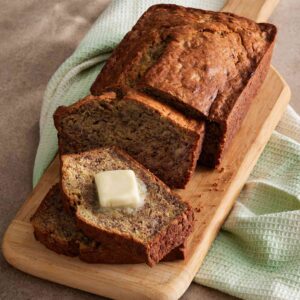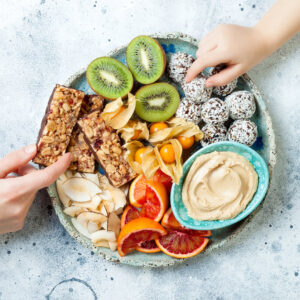Are you looking for ways to improve your diet and overall health? Look no further than healthy fats! Contrary to popular belief, not all fats are bad for you. In fact, some fats are essential for maintaining good health. In this article, we’ll explore the benefits of healthy fats and provide you with some delicious recipes to help you incorporate them into your diet.
Table of Contents
Healthy fats 1: Avocado Toast
Avocado toast is a delicious and healthy breakfast option that’s packed with healthy fats. Simply toast a slice of whole-grain bread, mash up half an avocado, and spread it on top of the toast. Sprinkle with salt and pepper to taste, and enjoy!
Nutritional Content of Basic Avocado Toast (per serving):
- Calories: Approximately 200-250 calories
- Fat: Approximately 15-20 grams (mainly healthy monounsaturated fats)
- Carbohydrates: Approximately 15-20 grams
- Dietary Fiber: Approximately 5-7 grams
- Protein: Approximately 3-5 grams
- Vitamins and Minerals: Avocado is a good source of vitamins and minerals, including potassium, vitamin K, vitamin E, vitamin C, and B vitamins.
It’s important to note that the specific nutritional content may vary depending on factors such as the type of bread used (whole grain, sourdough, etc.), the amount of avocado spread, and any additional toppings or seasonings.
As for dishes that feature Avocado Toast, here are a few popular variations:
- Classic Avocado Toast: The basic version, which typically includes mashed avocado spread on toasted bread, is seasoned with salt, pepper, and optional toppings like red pepper flakes or lemon juice.
- Avocado Toast with Poached Egg: A favorite breakfast or brunch option, where a poached or fried egg is placed on top of the avocado spread, often garnished with herbs and spices.
- Smashed Avocado Toast: Similar to the classic version but with the avocado roughly smashed for a chunkier texture.
- Avocado Toast with Smoked Salmon: This savory option combines creamy avocado with smoked salmon, capers, and red onion for a delightful and nutritious meal.
- Vegan Avocado Toast: A plant-based version that may include avocado spread, roasted tomatoes, sautéed spinach, or other vegan-friendly toppings.
- Avocado Toast with Bacon: For those who enjoy a savory and slightly indulgent twist, crispy bacon can be added to the avocado toast.
- Avocado Toast with Microgreens: A healthy and colorful option featuring a variety of microgreens, which are packed with nutrients and add a fresh, peppery flavor.
Healthy fats 2: Salmon Salad
Salmon is an excellent source of healthy omega-3 fatty acids. To make a delicious salmon salad, simply mix together some cooked salmon, chopped vegetables like cucumber and tomato, and a drizzle of olive oil. Serve over a bed of greens for a healthy and satisfying lunch.
Nutritional Values for a Typical Salmon Salad (Approximately 1 cup or 150 grams):
- Calories: Approximately 250-300 calories
- Protein: Approximately 20-25 grams
- Fat: Approximately 15-20 grams (mainly from the salmon and any added dressing)
- Carbohydrates: Approximately 5-10 grams (mainly from vegetables and any added ingredients)
- Fiber: 2-4 grams (mainly from vegetables and greens)
- Saturated Fat: About 2-3 grams (varies based on ingredients)
- Cholesterol: Approximately 40-60 milligrams (mainly from the salmon)
- Sodium: Approximately 300-500 milligrams (varies based on ingredients and dressings)
- Vitamins: Salmon is a good source of vitamins such as vitamin D, vitamin B12, and vitamin B6. The vegetables in the salad contribute vitamins like vitamin A, vitamin C, and vitamin K.
- Minerals: Salmon provides minerals like selenium and phosphorus. Vegetables can add minerals such as potassium and folate.
- Omega-3 Fatty Acids: Salmon is rich in omega-3 fatty acids, which are beneficial for heart health and brain function
Healthy fats 3: Peanut Butter Banana Smoothie
Peanut butter is another great source of healthy fats. To make a delicious peanut butter banana smoothie, simply blend together some peanut butter, banana, almond milk, and ice. This smoothie is perfect for breakfast or as a mid-day snack.
Nutritional Values for a Peanut Butter Banana Smoothie (Serving Size: 1 smoothie (about 12-16 ounces)):
- Calories: Approximately 300-400 calories
- Protein: 8-12 grams
- Fiber: 4-6 grams
- Fat: 10-15 grams (mainly from peanut butter)
- Carbohydrates: 40-50 grams (mainly from bananas and any added sweeteners)
- Sugar: 15-25 grams (naturally occurring sugars from bananas and any added sweeteners)
- Vitamins and Minerals: The smoothie is a good source of potassium, vitamin C, vitamin B6, and folate due to the bananas. Peanut butter contributes healthy fats, protein, and vitamin E.
Healthy fats 4: Dark Chocolate Bark
Dark chocolate is loaded with healthy antioxidants and fats. To make a delicious dark chocolate bark, simply melt some dark chocolate in the microwave or on the stove. Add in some chopped nuts or dried fruit if desired, and spread the mixture out on a baking sheet. Allow to cool in the fridge for at least an hour before breaking into pieces.
Here’s a general overview of the typical nutritional content for a 1-ounce (28-gram) serving of dark chocolate bark:
- Calories: Approximately 150-170 calories
- Fat: Approximately 10-12 grams
- Saturated Fat: Approximately 6-7 grams
- Carbohydrates: Approximately 15-18 grams
- Dietary Fiber: Approximately 2-3 grams
- Sugars: Approximately 10-12 grams
- Protein: Approximately 1-2 grams
- Iron: Approximately 10-15% of the Daily Value (DV) based on a 2,000-calorie diet
- Potassium: Approximately 150-200 milligrams
- Magnesium: Approximately 15-20% of the DV based on a 2,000-calorie diet
Conclusion
Healthy fats are an essential component of a balanced diet. They offer a wide range of benefits, including supporting heart health, aiding in nutrient absorption, and providing a source of long-lasting energy. Incorporating sources of healthy fats like avocados, nuts, seeds, and fatty fish into your meals can contribute to overall well-being and help you maintain a more balanced and nutritious diet.
Call to Action
It’s important to remember that moderation is key, as even healthy fats are calorie-dense. Balancing your fat intake with other macronutrients, such as carbohydrates and protein, is essential for optimal health. By making mindful choices and prioritizing healthy fats, you can enhance the quality of your diet and promote a healthier, more vibrant life.
Follow us to see more useful information, as well as to give us more motivation to update more useful information for you.





